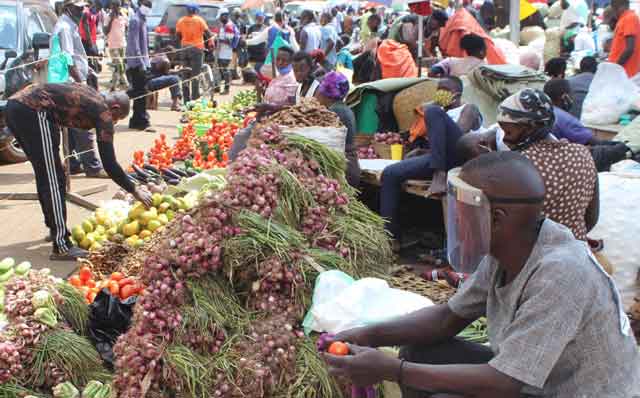
Kampala, Uganda | THE INDEPENDENT | More Ugandans could drift into poverty unless government comes up with measures to cushion those that have been rendered jobless as a result of COVID-19 pandemic.
As the world marks observesthe International Day for the Eradication of Poverty, there are fears that poverty level in Uganda may increase due unemployment resulting from the COVID-19 containment measures. The International Day For Eradication of Poverty is observed annually on 17 October.
Uganda has so far lost 96 people due to COVID-19 with over ten thousands cases since president Museveni instituted a nation-wide lockdown in March 2020.
A survey by Twaweza about citizens’ experiences about personal basic needs under COVID-19 paints a worrying pictures about unemployment and social welfare.
Marie Nanyanzi, a Sauti Za Wanainchs Programs Officer at Twaweza’s officer in Kampala says the government and its policy makers should seriously consider the issues of social protection to help Ugandans.
Members Parliament had suggested that employees should be allowed to access some of their saving with National Social Security Fund but the suggestion has been resisted by Finance Ministry and NSSF officials.
According to a group of UN Agencies, the COVID-19 pandemic has not only led to a “dramatic loss” of human life but also constitutes an “unprecedented challenge” to public health, food systems and employment.
PricewaterhouseCoopers in July estimated that fifty thousand job were likely to be lost in the formal sector, while in the formal sector, the body estimated that in the formal sector, about one million jobs are likely to be lost.
From the Twaweza survey one out of ten citizens (8%) has no work to go back to after this period. The unemployment levels according to the survey were higher in urban areas (10%) compared to rural (7%).
“What we see from this data is that a number of citizens did not have any work to go back to after the lockdown. And most of these do not have any hope on what next. That is when the lockdown had been lifted.” said Nanyanzi
She says among those who have no work to go back to, four out of ten (39%) say they will have to depend on friends and family.
Bryan Jumba, an economist and development consultant says COVID-19 in Uganda like the rest of the world is likely to impact gains towards attainment of goal 8 of the UN Sustainable Development Goals (SDGS).
SDustainable Development Goals (SDGS) eight requires promotion of sustained, inclusive and sustainable economic growth, full and productive employment and decent work for all as a measure to ensure that generally the world is in a better place.
Jumba says there is need to measures in the COVID-19 rescue package to ensure that Uganda does not lose over one million jobs because that would worsen the unemployment crisis that had existed before COVID-19.
According to the Twaweza survey, among Ugandans that have no work to go back to, four out of ten (39%) say they will have to depend on friends and family.
Jumba says COVID-19 has taken a mental and physical toll on many of the Ugandans who lost jobs at the time of lockdown or those that are yet to return to work because of some of the containment measures that still exist.
“It will be difficult for us to adequately calculate or give the proper cost to what this will cost to our economy because it is not a straight-line measure “said Jumba.
A report by Development Initiatives on socioeconomic impact of Covid-19 in Uganda in August predicted likely increase in poverty as the economy slows down.
Those increases according to the study are likely to increase the likelihood of a rise in poverty during and after the Covid-19 pandemic.
From the budget perspective, Development Initiatives said while the budget expenditures for FY2020/21 have grown compared to that for FY2019/20, the increase did not seem to be driven by the anticipated cost of Covid-19 response measures in FY2020/21.
Director of Labor, Occupational Safety and Health at the Ministry of Gender, Martin Wandera says before COVIID-19 lockdown, 8.9 million Ugandans were relaying on employment for livelihood. He is of the view that the discussion of creating employment through the prism of COVID-19.
“What Covid has simply done was to introduce a new dimension to the challenge that already existed. And what government has continuously addressed. This is something that has been there. Perhaps what COVID has done is to cast more attention to this matter” says Wandera
Wandera was one of the speakers at virtual Castle Think Tank debate work and employment during COVID. He is of the opinion that analysts risk suggesting that prior to COVID-19 there was no problem of unemployment.
“The position of the government of the Covid pandemic and its impact on the economy is that the current containment measures are temporary. Like all other pandemics, this pandemic will come to pass. Sectors that remain currently un operational will like the way night follows day, one-day resume. It is just a question of when” Said Wandera
While some of the lockdown measures have been eased since June, a number of people previously employed by sectors like entertainment, bars and education among others are remain jobless and have drifted into poverty.
According to the UN, roughly half the world’s population still lives on the equivalent of about US$2 a day and that in too many places, having a job doesn’t guarantee the ability to escape from poverty.
Sauti Za Wanainchi survey says a quarter of households (26%) now report that their income is insufficient to cover their basic daily needs, a slight increase from 22% in January 2020. The increased financial strain is seen particularly in rural areas.
********
URN
 The Independent Uganda: You get the Truth we Pay the Price
The Independent Uganda: You get the Truth we Pay the Price





